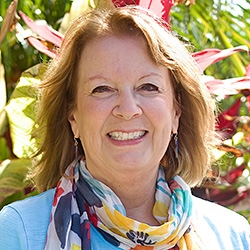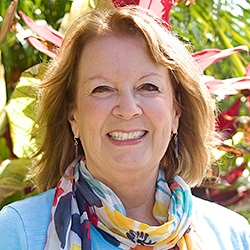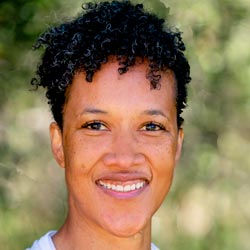

Search Results: activism
-
For this practice assume that reactivity is arising any time you are distracted and not enjoying something. Practice throughout the day by focusing your attention for a few moments on something specific that you find pleasing. Notice the sensation of joy or pleasure in your body, and hold attention there longer than usual. This interrupts tension and contraction. Keep remembering to do this. When you go too long without directing your attention in this way, the practice becomes less accessible.
-
With practice we can prevent reactivity from overtaking and harming: notice signs of reactivity, bring compassion to it, see reactivity as the misperception of threat and a distortion of what's happening, plus engage and pursue connection and the clarity to weaken reactive impulses. In taking responsibility like this overtime, you can live from your values and from care. And life can get easier for you and others around you.
-
Tolerating reactivity, name-calling, blaming, guilt-tripping, or stonewalling can lead to resentment and hurt. Plus, the more you stay in a reactive dynamic, the more you are likely to reinforce the pattern. Setting life-serving boundaries around reactivity is about letting another know that you aren’t going to participate in that kinds of dynamics. This means knowing what helps with handling difficulties and asking for that.
-
Reactivity can harm relationships, but there are three keys to prevent or dissolve reactivity: discernment (recognize reactivity and interrupting it), transparency (express feelings and wants honestly and making simple requests), support for conscious connection (remind ourselves to practice prioritizing connection in interactions). Practice these to maintain fulfilling relationships and reduce impacts caused by reactivity.
-
When we care about our cause and want to mitigate disaster, we may become reactive. However, transformation comes through connection, rather than convincing, judging, criticising, controlling, and making demands of others. To inspire change, get curious about how they relate to the topic – and get support for yourself elsewhere to process grief, become more present and compassionate, speak self-responsibly, and make requests.
-
Most reactivity in intimate relationships comes from a lack of confidence in maintaining intimacy, autonomy, or security. What may help is naming what's happening, interrupting shame, and anchoring or reassuring yourself. You can also reflect on the effects of acting from reactivity. Knowing what helps center you, ask your partner to do or say specific things that might help. Read on for more.
-
For each reactive pattern there is a perceived threat to a tender need. Knowing these tender needs helps us figure out how to interrupt these patterns and creating new ways of perceiving and relating to life. In addition to knowing the need, knowing the healing response and the primary reactive behavior helps with transformation.
-
Join CNVC Certified Trainers Jim and Jori Manske for this session that will help you minimize your reactivity and live in greater choice.
-
Here are 16 helpful requests you can make before you're swept up in your own reactivity.
-
There's reactive anger - the sudden outbursts of words, temper or action that create a nervous system response in another. And then there's the anger that's a reaction to someone's anger -- a nervous system startle-response. Instead of either of these, we can learn to heal with empathy, look for unequal power dynamics, take responsibility to make repairs, and shift into the clean, life-serving, fully expressed anger and love.
-
Listen as Mary Mackenzie shares an eight step path to create your own NVC learning activities, based on your own NVC learning experience. In this session, Mary uses the value of requests and observations as teaching examples.
-
To shift reactivity by moving yourself from the position of experiencer to observer, name what’s happening. This can help you access other skills for managing reactivity. Also, create a strong emotional anchor.
-
Reactivity is the misperception of threat coupled with lack of access to compassion and wisdom. Sensitivity is an ability to deeply perceive data, plus consciously attend to and attune to data, as it comes through the five senses. It can be a gift. If you lack the skill to care for any of your sensitivity-overwhelm by setting boundaries, you may develop reactive habits, like suddenly withdrawing or lashing out in order to get relief.
-
In healing reactivity try identifying your most common complaints, wishes, or requests. Or when you tend to defend, justify, get angry, or protect. Find the tender needs. You can recall when you experienced deep nourishment of that need. Several times a week nourish your tender needs. Be clear about the strategy to address needs by answering key questions. Read on for more.
-
-
Join Jim and Jori Manske in a thought experiment exercise designed to help us become more aware of our conditioning, allowing us to make more conscious and connected choices in the face of conflict.
-
-
Borrowing teaching exercises from others can be fun and easy. However, when you develop your own, it deepens your learning and enables you develop your own teaching style.
-
Hi friends, My name is Itzel and I’m happy for this opportunity to share a bit about myself and how I came to teach NVC. I was an activist before I knew what the word meant. When I was a child, I often argued with the adults around me about what I thought was “right.” If I had a nickel for every time a grown-up said to me, “You should be a lawyer,” I probably would’ve collected enough money to pay for the law school education that I eventually got. I left my traditional legal career path after more than a decade to become a...
-

Quick Links
Subscription Preferences
Stay In Touch!
Looking for ways to keep up with NVC Academy news, get special offers, free resources, or words of inspiration? Here are five ways to stay engaged:

















